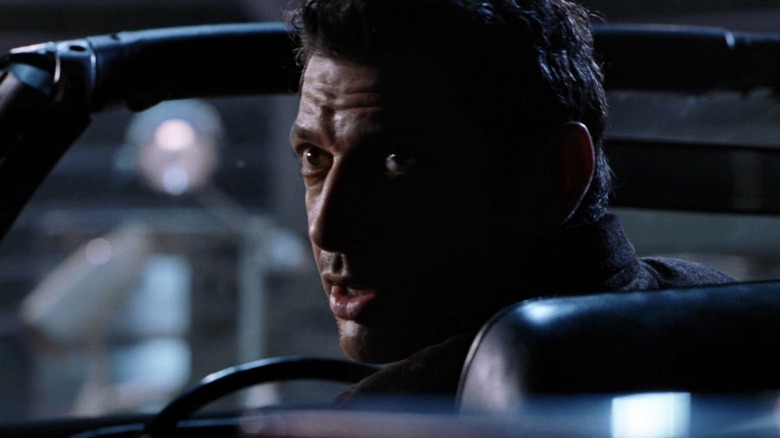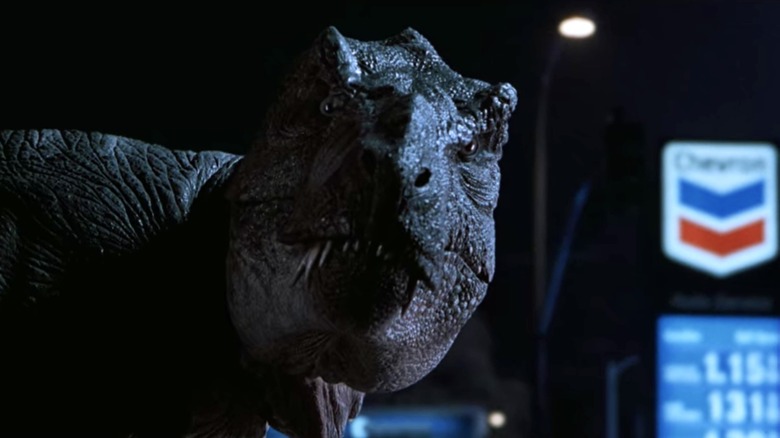Steven Spielberg Knows What Went Wrong With The Lost World: Jurassic Park
Outside the "Indiana Jones" franchise, the only sequel Steven Spielberg has directed in his long, illustrious career is "The Lost World: Jurassic Park," in which Jeff Goldblum reprised his role as chaos theorist Ian Malcolm, opposite Julianne Moore. Adapted from Michael Crichton's best-selling novel, "The Lost World" received mixed reviews and is generally considered one of Spielberg's lesser efforts. It's one of those rare instances where, on Rotten Tomatoes, the critical consensus (53%) is almost directly aligned with the audience score (51%).
Spielberg has made plenty of crowd-pleasers and, if nothing else, his six decades of Oscar nominations put him right up there with Martin Scorsese as a contender for the title of "greatest living filmmaker." With "The Lost World," however, he failed to connect with moviegoers the same way that he did in the original "Jurassic Park." But at least the filmmaker understands his mistake.
To hear Spielberg tell it, the enormous success of "Jurassic Park," which became a cultural phenomenon and one of the highest-grossing films of all time, may have actually put him in the wrong headspace when he was making "The Lost World." In 2016, while promoting his Roald Dahl adaptation "The BFG," Spielberg sat down for an interview with The New York Times, where he admitted:
"Confidence is my enemy and it always has been. My sequels aren't as good as my originals because I go onto every sequel I've made and I'm too confident. This movie made a ka-zillion dollars, which justifies the sequel, so I come in like it's going to be a slam dunk and I wind up making an inferior movie to the one before. I'm talking about 'The Lost World' and 'Jurassic Park.'"
The Lost World may explain Indiana Jones 5
Arguably, the one memorable thing about "The Lost World: Jurassic Park" is its ending, where a cargo ship brings the Tyrannosaurus rex back to the mainland, allowing it to escape to wreak havoc on San Diego. With its title, Spielberg's movie openly acknowledges the influence of Harry O. Hoyt's 1925 silent film, "The Lost World," where explorers bring a brontosaurus back to London, and it goes on the rampage.
Hoyt's film influenced "King Kong," which, in turn, influenced "Godzilla." Over the decades, many films have replicated the same formula of prehistoric creatures running amok in human civilization, including the upcoming 2022 legacy sequel, "Jurassic World Dominion."
What Spielberg seems to suggest with his reflection on "The Lost World" is that the tension of not knowing whether a movie is going to be successful can sometimes be good for the filmmaking process. In a lot of ways, this is antithetical to the nature of modern tentpoles, which seek to cash in on the surefire success of intellectual properties with a built-in fanbase. Maybe this is part of the reason why Spielberg decided to finally give up the director's chair for "Indiana Jones 5."
While many fans may love all three films in the original 1980s Indiana Jones trilogy, Spielberg himself is not enamored of "Indiana Jones and the Temple of Doom." He once told the Sun Sentinel:
"I wasn't happy with ['Temple of Doom'] at all. It was too dark, too subterranean, and much too horrific. I thought it out-poltered Poltergeist. There's not an ounce of my own personal feeling in Temple of Doom."
"Indiana Jones and the Kingdom of the Crystal Skull" also left us with the phrase "nuking the fridge," in reference to when a once-great film series crosses over into diminished returns. With a track record for sequels that's ultimately hit-or-miss, you can't fault Spielberg for wanting to focus on other projects, like his 2021 Oscar darling, "West Side Story."

